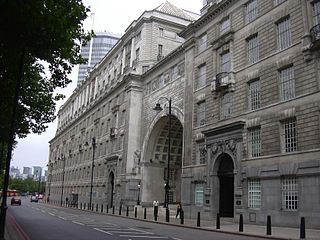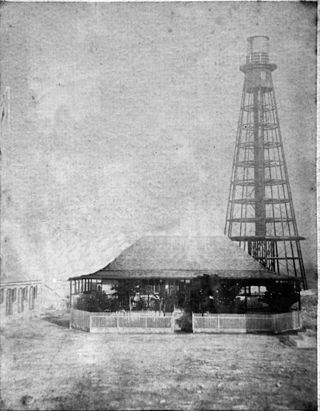
Hedley Byrne & Co Ltd v Heller & Partners Ltd [1964] AC 465 is an English tort law case on economic loss in English tort law resulting from a negligent misstatement. Prior to the decision, the notion that a party may owe another a duty of care for statements made in reliance had been rejected, with the only remedy for such losses being in contract law. The House of Lords overruled the previous position, in recognising liability for pure economic loss not arising from a contractual relationship, applying to commercial negligence the principle of "assumption of responsibility".

Raffles v Wichelhaus [1864] EWHC Exch J19, often called "The Peerless" case, is a leading case on mutual mistake in English contract law. The case established that where there is latent ambiguity as to an essential element of the contract, the Court will attempt to find a reasonable interpretation from the context of the agreement before it will void it.
The Private Securities Litigation Reform Act of 1995, Pub. L. 104–67 (text)(PDF), 109 Stat. 737 ("PSLRA") implemented several substantive changes in the United States that have affected certain cases brought under the federal securities laws, including changes related to pleading, discovery, liability, class representation, and awards fees and expenses.

In common law jurisdictions, a misrepresentation is a false or misleading statement of fact made during negotiations by one party to another, the statement then inducing that other party to enter into a contract. The misled party may normally rescind the contract, and sometimes may be awarded damages as well.
SEC Rule 10b-5, codified at 17 CFR 240.10b-5, is one of the most important rules targeting securities fraud promulgated by the U.S. Securities and Exchange Commission, pursuant to its authority granted under § 10(b) of the Securities Exchange Act of 1934. The rule prohibits any act or omission resulting in fraud or deceit in connection with the purchase or sale of any security. The issue of insider trading is given further definition in SEC Rule 10b5-1.

Smith v Hughes (1871) LR 6 QB 597 is an English contract law case. In it, Blackburn J set out his classic statement of the objective interpretation of people's conduct when entering into a contract. The case regarded a mistake made by Mr. Hughes, a horse trainer, who bought a quantity of oats that were the same as a sample he had been shown. However, Hughes had misidentified the kind of oats: his horse could not eat them, and refused to pay for them. Smith, the oat supplier, sued for Hughes to complete the sale as agreed. The court sided with Smith, as he provided the oats Hughes agreed to buy. That Hughes made a mistake was his own fault, as he had not been misled by Smith. Since Smith had made no fault, there was no mutual mistake, and the sale contract was still valid.

L'Estrange v F Graucob Ltd [1934] 2 KB 394 is a leading English contract law case on the incorporation of terms into a contract by signature. There are exceptions to the rule that a person is bound by his or her signature, including fraud, misrepresentation and non est factum.

Ultramares Corporation v. Touche, 174 N.E. 441 (1932) is a US tort law case regarding negligent misstatement, decided by Cardozo, C.J. It contained the now famous line on "floodgates" that the law should not admit "to a liability in an indeterminate amount for an indeterminate time to an indeterminate class."

Royscot Trust Ltd v Rogerson[1991] EWCA Civ 12 is an English contract law case on misrepresentation. It examines the Misrepresentation Act 1967 and addresses the extent of damages available under s 2(1) for negligent misrepresentation.

Daulia Ltd v Four Millbank Nominees Ltd [1977] is an English contract law case, concerning unilateral contracts, and when embarking on the performance of an act for which an offer is open, at what point the offer may be withdrawn. In particular, Goff LJ observed that there would be a duty to not prevent full performance of terms in a unilateral offer, once performance had begun.

Erlanger v New Sombrero Phosphate Co (1878) 3 App Cas 1218 is a landmark English contract law, restitution and UK company law case. It concerned rescission for misrepresentation and how the impossibility of counter restitution may be a bar to rescission. It is also an important illustration of how promoters of a company stand in a fiduciary relationship to subscribers.

Addis v Gramophone Co Ltd [1909] AC 488 is an old English contract law and UK labour law case, which used to restrict damages for non-pecuniary losses for breach of contract.
Dimmock v Hallett (1866–67) LR 2 Ch App 21 is an English contract law case, concerning misrepresentation.

Chysky v. Drake Bros. Co., 235 N.Y. 468, 139 N.E. 576 (1922), was a products liability case before the New York Court of Appeals. The Court held that a plaintiff cannot recover from a defendant based on implied warranty when she does not have contractual privity with him; thus, a plaintiff cannot recover from a defendant who sold her employer food unfit for consumption, because the defendant's implied warranty extended only to the employer.
Tamplin v James (1880) 15 Ch D 215 is an English contract law case concerning the availability of specific performance for a breach of contract induced by mistake. The case established that if a person enters a contract under a mistake that was not induced by the other party to the contract, specific performance may be awarded against the person if no hardship amounting to clear injustice would be inflicted on the person by holding him/her to the contract.

Dutton v Bognor Regis Urban District Council [1972] 1 QB 373 is an English contract law and English tort law case concerning defective premises and the limits of contract damages. It was disapproved by the House of Lords in Murphy v Brentwood DC and is now bad law except in Canada and New Zealand.
Maseko v Maseko, heard in the Witwatersrand Local Division by Lazarus AJ from 22 to 25 October, 1990, with judgment handed down on 16 November, is an important case in South African contract law, with its stipulation, on the question of legality, that contracts designed to mislead creditors are immoral and against public policy.
Kragga Kamma Estates CC and Another v Flanagan is an important case in the South African law of contract, an appeal from a decision in the South Eastern Cape Local Division by Jansen J. It was heard in the Appellate Division on August 19, 1994, with judgement handed down on September 29. The presiding officers were EM Grosskopf JA, Nestadt JA, Kumleben JA, Howie JA and Nicholas AJA. The appellants' attorneys were Tobie Oosthuizen, Port Elizabeth, and Webbers, Bloemfontein. The respondent's attorneys were Jankelowitz, Kerbel & Schärges, Port Elizabeth, and Lovius-Block, Bloemfontein. HJ van der Linde appeared for the appellants; JRG Buchanan SC for the respondent.

Solle v Butcher [1950] 1 KB 671 is an English contract law case, concerning the right to have a contract declared voidable in equity. Denning LJ reaffirmed a class of "equitable mistakes" in his judgment, which enabled a claimant to avoid a contract. Denning LJ said,
... a contract will be set aside if the mistake of the one party has been induced by a material misrepresentation of the other, even though it was not fraudulent or fundamental; or if one party, knowing that the other is mistaken about the terms of an offer, or the identity of the person by whom it is made, lets him remain under his delusion and concludes a contract on the mistaken terms instead of pointing out the mistake.... A contract is also liable in equity to be set aside if the parties were under a common misapprehension either as to facts or as to their relative and respective rights, provided that the misapprehension was fundamental and that the party seeking to set it aside was not himself at fault.

Seixas & Seixas v. Woods 2 Cai. R. 48 was an 1804 American case which contributed to precedent around the doctrine of caveat emptor. The plaintiff Seixas & Seixas purchased wood from the defendant and alleged that he had been delivered a lower grade of wood than he had contracted to purchase.













